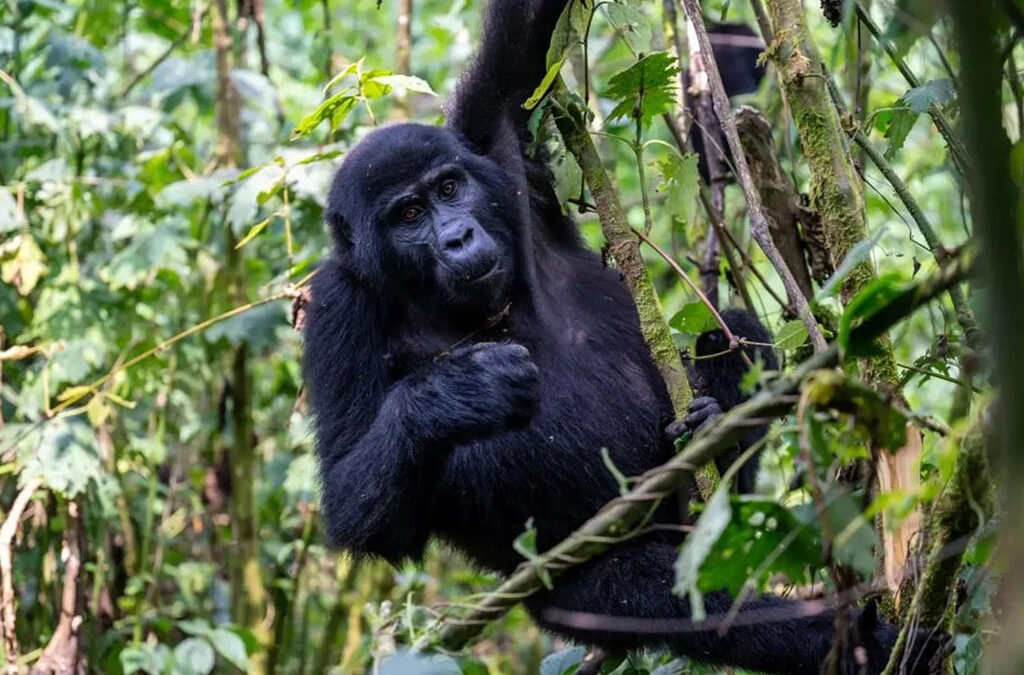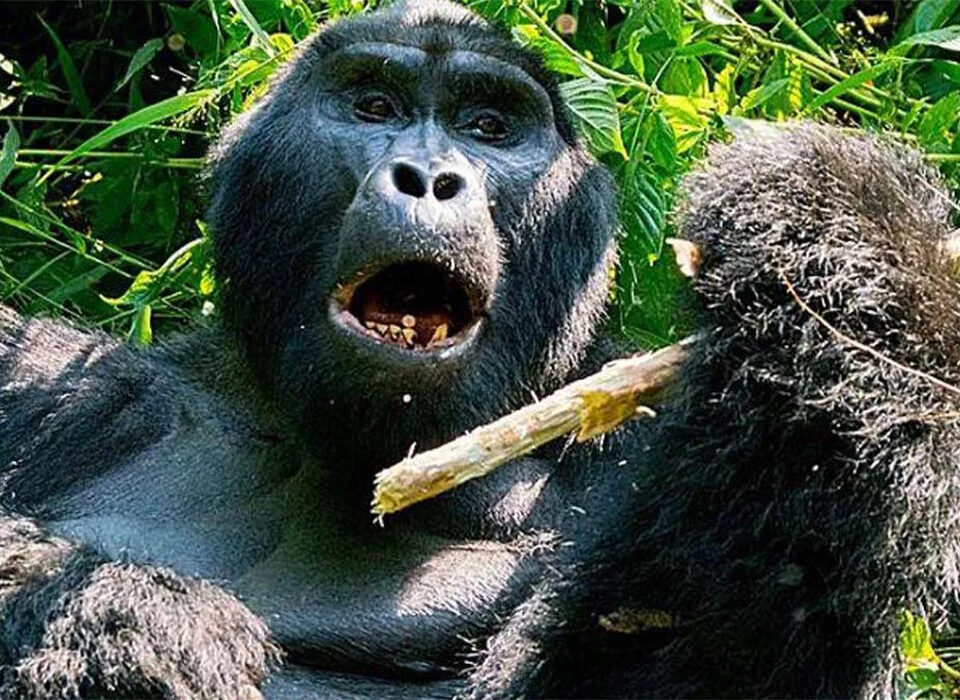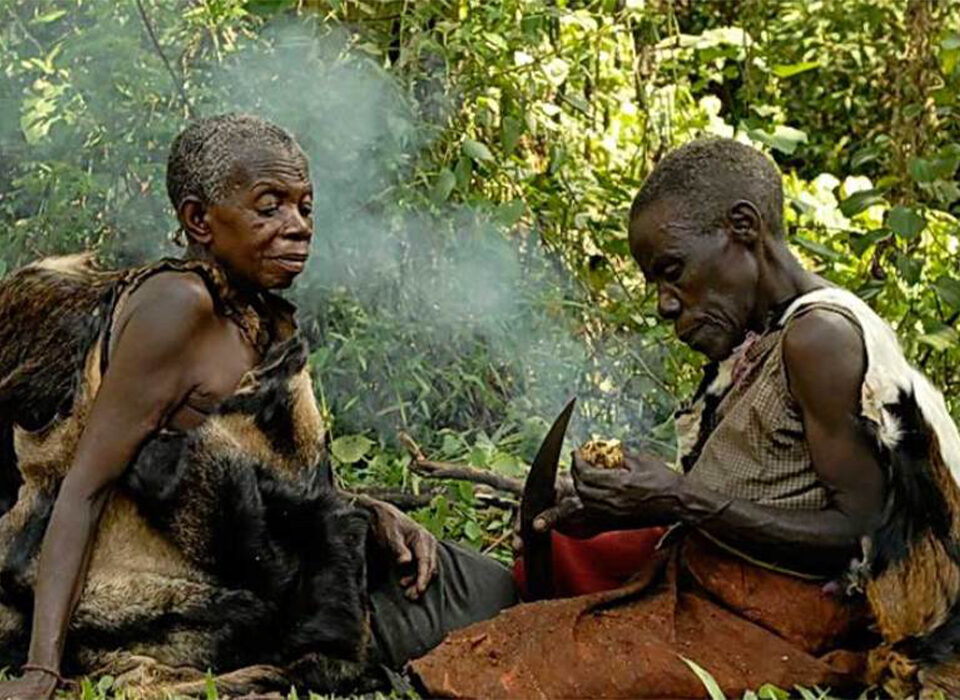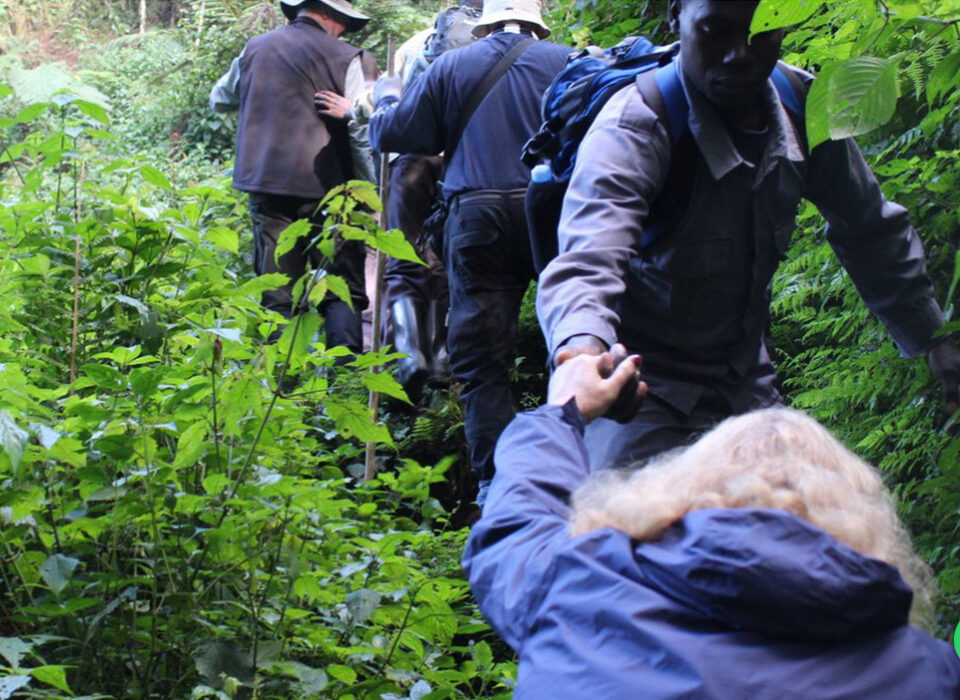
How to Book a Domestic Flight in Uganda
October 9, 2025
Unique Behaviors of Ishasha’s Tree-Climbing Lions
October 10, 2025Can I Visit Gorillas Without a Permit?

Can I visit gorillas without a permit? The unequivocal answer is no — visiting mountain gorillas in their natural habitats without an official permit is strictly prohibited and illegal in all gorilla-hosting countries.
These mandatory restrictions exist for critical reasons: protecting endangered mountain gorillas and their fragile ecosystems, ensuring visitor safety through professional guidance, and funding conservation programs that sustain species survival.
Uganda, Rwanda, and the Democratic Republic of Congo (DRC) all require valid permits issued by designated wildlife authorities before granting access to gorilla habitats. The permit system regulates daily visitor numbers per gorilla family, generates crucial conservation revenue, prevents disease transmission, and ensures ethical wildlife encounters that prioritize gorilla welfare over human entertainment.
Understanding the permit requirements, the consequences of violations, and the right ways to obtain a permit is essential for anyone seeking a responsible gorilla trekking experience.
Fundamental Reasons Behind Gorilla Permit Requirements
1. Critical Conservation Funding
Gorilla permit revenues form the financial foundation supporting conservation programs across the gorillas’ limited range. The funds directly sustain anti-poaching patrols, veterinary care, habitat protection, park infrastructure, and scientific research aimed at understanding gorilla ecology and behavior.
Without tourism income, maintaining intensive protection programs would be nearly impossible, especially for developing nations with limited conservation budgets.
In Uganda, gorilla permits cost about $800, while Rwanda’s cost $1,500. These fees generate millions of dollars annually that support ranger salaries, purchase essential equipment, fund patrol operations, and invest in community development projects. This financial support creates economic incentives for local communities to protect gorilla habitats rather than engage in harmful activities such as farming, logging, or mining.
In short, responsible tourism helps ensure gorilla conservation remains financially sustainable while delivering tangible benefits to nearby human communities.
2. Regulating Visitor Numbers
The permit system also controls the number of visitors each day. Only eight people may visit a gorilla family per day. This strict limit prevents overcrowding that can cause stress, disrupt feeding, and interfere with gorillas’ natural behaviors.
Scientific studies show that when professional guides enforce respectful behavior and time limits, gorillas experience minimal stress. However, uncontrolled access would likely cause behavioral changes, health issues, and population-level impacts that could undo decades of conservation work.
By regulating visitor numbers, authorities also prevent habitat degradation from excessive foot traffic and ensure a high-quality experience for visitors through calm, uncrowded encounters.
3. Ensuring Visitor Safety
Every valid permit includes professional services from licensed guides and armed rangers. These experts lead trekking groups through challenging forest terrain, locate gorilla families, and protect visitors from potential threats such as forest elephants, buffaloes, or defensive gorilla behavior.
Without official guidance, visitors face serious safety risks in remote areas where emergency medical help is difficult to access. The presence of armed rangers also discourages poaching and assures tourists of their safety while trekking.
The permit system enforces strict safety rules — including maintaining a minimum distance of seven meters, keeping group sizes small, avoiding flash photography, and obeying guides immediately in case of sudden gorilla movements.
4. Preventing Disease Transmission
Mountain gorillas share about 98% of their DNA with humans, making them highly vulnerable to human diseases such as flu, colds, and respiratory infections. Illnesses that are mild in humans can be deadly for gorillas with no immunity.
Before trekking, visitors undergo health screenings to ensure they are disease-free. Anyone showing symptoms such as coughing, sneezing, or fever is not allowed to proceed. This precaution protects entire gorilla families from potentially devastating outbreaks.
These health protocols form a cornerstone of gorilla conservation, ensuring that tourism never threatens the very species it seeks to protect.
Consequences of Visiting Gorillas Without a Permit
1. Heavy Legal Penalties
Uganda, Rwanda, and the DRC impose severe fines on individuals found accessing gorilla habitats illegally. The penalties often exceed the cost of a legitimate permit and may include criminal charges. These fines act as a powerful deterrent to prevent illegal visits.
2. Criminal Prosecution and Imprisonment
Serious offenses — such as repeated violations or actions that endanger gorillas — can lead to criminal prosecution and imprisonment. Governments treat these cases seriously to protect critically endangered species. Courts across the region have issued harsh sentences to demonstrate that wildlife crimes will not go unpunished.
3. Permanent Trekking Bans
Convicted offenders often face lifetime bans from gorilla trekking in all host countries. Authorities share information regionally, preventing offenders from booking permits under different names or in other countries. This system reinforces respect for conservation laws and ensures that violators cannot repeat their actions.
4. Undermining Conservation Efforts
Illegal visits undermine carefully designed conservation strategies by exposing gorillas to unregulated human contact and disease risks. Such actions can also disrupt gorilla behavior and erode community trust in conservation initiatives.
When outsiders break rules, local communities who depend on tourism and follow regulations—may lose motivation to support conservation. This can lead to increased tension and reduced participation in protection programs.
Ethical and Legal Alternatives to Gorilla Trekking Without a Permit
1. Visit Gorilla Rehabilitation Sanctuaries
If you cannot secure a trekking permit, consider visiting sanctuaries like the Senkwekwe Center in the DRC. These facilities care for orphaned or rescued gorillas that cannot survive in the wild. Though the experience differs from trekking, it still offers an opportunity to learn about gorilla conservation and support their welfare.
2. Support Conservation Organizations
If permits are unavailable or unaffordable, you can still contribute meaningfully by donating to organizations such as the Dian Fossey Gorilla Fund, Gorilla Doctors, or the World Wildlife Fund. Your support helps finance anti-poaching patrols, veterinary care, habitat protection, and community development projects that benefit both people and wildlife.
3. Try Alternative Primate Tracking Experiences
If gorilla trekking exceeds your budget, consider chimpanzee trekking in places like Kibale National Park in Uganda. Chimp permits are less expensive but still contribute to conservation and offer equally rewarding primate encounters
How to Obtain a Legitimate Gorilla Permit
To trek with gorillas legally, you must obtain a permit through official wildlife authorities or licensed tour operators.
- Uganda Wildlife Authority (UWA) issues gorilla permits for about $800 for foreign non-residents.
- The permit covers park entry fees, guide services, and a one-hour gorilla viewing session.
- Booking should be done 3–6 months in advance, especially during the peak tourism season, as permits are limited and sell out quickly.
- Travelers must provide passport details, make full payments in advance, and present official confirmation on the trekking day.
By following these steps, you ensure a legal, safe, and ethical gorilla trekking experience that supports conservation and respects local communities.
Final Thoughts
Visiting gorillas without a permit is not only illegal but also deeply harmful to ongoing conservation efforts. The permit system safeguards gorillas, protects visitors, and funds the survival of one of the world’s most remarkable species.
Responsible tourism ensures that future generations can continue to marvel at these gentle giants thriving peacefully in their natural forest homes.



